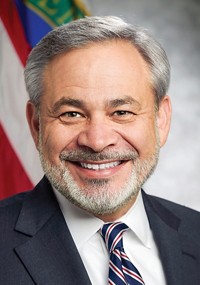Advertisement
Grab your lab coat. Let's get started
Welcome!
Welcome!
Create an account below to get 6 C&EN articles per month, receive newsletters and more - all free.
It seems this is your first time logging in online. Please enter the following information to continue.
As an ACS member you automatically get access to this site. All we need is few more details to create your reading experience.
Not you? Sign in with a different account.
Not you? Sign in with a different account.
ERROR 1
ERROR 1
ERROR 2
ERROR 2
ERROR 2
ERROR 2
ERROR 2
Password and Confirm password must match.
If you have an ACS member number, please enter it here so we can link this account to your membership. (optional)
ERROR 2
ACS values your privacy. By submitting your information, you are gaining access to C&EN and subscribing to our weekly newsletter. We use the information you provide to make your reading experience better, and we will never sell your data to third party members.
Business
An Industry Revived
Chemical executives at annual meeting revel in good times, stay wary on regulations
by Michael McCoy
June 20, 2011
| A version of this story appeared in
Volume 89, Issue 25

The mood was buoyant at the American Chemistry Council’s annual meeting at the Broadmoor hotel in Colorado Springs earlier this month. The recession is just a distant bad memory for most chemical companies, and the legislative tidal wave companies once feared has ebbed, at least somewhat, with the now-divided Congress.
At a press conference, Calvin M. Dooley, ACC’s president and chief executive officer, described the remarkable economic turnaround he has witnessed since his first annual meeting at the industry trade association’s helm, in June 2009.
“Two years ago this industry was struggling to respond to one of the steepest recessions this country had faced in some time,” he said. “Few of us would have anticipated that we’d see the industry turn around and be in one of the strongest positions it’s been in in decades.”
One of the reasons for that strength is ample U.S. supplies of low-cost natural gas, which chemical companies use as both energy source and raw material. Company representatives on ACC’s executive committee explained that the good feedstock position means chemical makers can compensate for any lingering softness in the U.S. economy by exporting products into the global marketplace.
B. Chuck Anderson, president of Occidental Chemical and vice chairman of ACC’s board, said his firm’s exports of polyvinyl chloride are more than compensating for continued weakness in the U.S. construction market. “I don’t see a lot of U.S. markets that are booming,” he said. “In general, the recovery is global.”
Anderson marveled at the good fortune pervading the U.S. basic chemicals industry at present—a fortune resulting largely from the competitive advantage that low natural gas prices have created. “Margins are at almost historic highs,” he said. “Petrochemical companies are reporting some pretty good results, and I expect to see phenomenal ones in the second quarter.”
One of ACC’s goals for the coming months and years, Dooley said, will be to ensure that the good times continue for its member companies. He vowed to maintain the association’s relentless focus on in-the-trenches advocacy. Since Dooley, a former congressman, joined ACC, a strategy of advocating for the industry with lawmakers, often on their home turf, has replaced a broader effort to educate the general public about chemistry through national advertising and Web-based outreach.
This strategy was in full effect at the association’s annual meeting a year ago, when staffers confessed to feeling under siege from the Obama Administration and the Democratic majorities in the House of Representatives and the Senate. The siege has weakened since last fall’s election, when the Democrats lost control of the House.
Still, Dooley isn’t resting easy. He contended that the White House is taking advantage of the political gridlock in Washington, D.C., to advance an aggressive regulatory agenda that is at odds with the President’s executive order that regulatory decisions be based on sound science.
Craig O. Morrison, CEO of Momentive Performance Materials and ACC’s treasurer, pointed to a June 2010 Environmental Protection Agency finding that formaldehyde can cause leukemia if inhaled. Believing the conclusion faulty, ACC successfully lobbied to have it peer reviewed by the National Academy of Sciences (NAS). That review, published in April, said the leukemia finding went beyond available scientific evidence.
Morrison credited ACC’s advocacy for helping secure the peer review, although he noted that the fight isn’t over. “We continue to battle to ensure EPA … abides by the NAS ruling,” he said. “We understand that we have to be regulated. We just ask that it be fact-based and scientifically based.”
Another source of ACC advocacy, according to Anne Womack Kolton, the association’s vice president of communications, is its 18-month-old political mobilization department, which is working to stop the New Alternative Transportation to Give Americans Solutions Act, nicknamed the NATGAS Act, a bipartisan bill that proposes to subsidize the purchase of natural-gas-powered vehicles. Concerned that such a policy would suck up gas supplies and erode the U.S. chemical industry’s new advantage, ACC is calling on member companies and their employees to raise their concerns with congressional representatives.
Opposition to the NATGAS Act is part of a larger energy initiative that ACC’s executive committee green-lighted at the annual meeting. In addition to sound natural gas policy, the initiative will advocate for making energy efficiency—often achieved with the industry’s products—as important as renewable energy in government policy-making. “Oftentimes energy efficiency gets shortchanged,” Dooley said. But it “is low-hanging fruit.”
As with ACC’s other advocacy efforts under Dooley, the energy initiative will be narrowly focused. “That message is going to be targeted not at the broader public,” he said, “but at those elected officials and people in positions that have the ability to influence policy.”







Join the conversation
Contact the reporter
Submit a Letter to the Editor for publication
Engage with us on Twitter